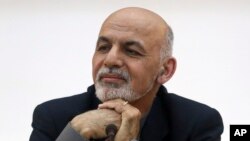Afghan President Ashraf Ghani and Chief Executive Abdullah Abdullah are visiting Washington this week and are expected to urge the Obama Administration to allow some flexibility in the pace of U.S. troop withdrawals. The visit of Afghanistan’s top leaders comes as the White House says extremist elements operating in Afghanistan continue to pose a threat to U.S. national interests.
Ghani and Abdullah will meet Monday with Defense Secretary Ashton Carter at the Pentagon. Later, they will hold talks with three U.S. Cabinet secretaries (defense, state, and treasury) and other national security officials.
Tuesday, the Afghan leaders meet with President Barack Obama and Vice President Joe Biden, and visit Arlington National Cemetery where many U.S. Afghan veterans are buried. On Wednesday, Ghani will address a joint meeting of Congress. Thursday, the Afghan leaders head to New York and meetings with U.N. officials.
US troop withdrawal
Before leaving Kabul Saturday, the Afghan leader said he is aware of the sensitivity in the U.S. of slowing the pace of the withdrawal of U.S. troops, currently at 9,800, after more than 13 years of conflict:
"[The] issue of numbers [of U.S. troops] is a very complicated domestic issue in the United States. We don’t want to get into it. We will explain the condition, what we are doing, how we are bringing those efficiencies and then we need to let the internal process take over and arrive at decisions that serves our need, the global needs and the security of the United States," said Ghani.
Now that the NATO/U.S. combat mission is over, the Obama administration has planned to reduce the current U.S. troops level down to 5,500 by year’s end and even less by the time Obama leaves office in early 2017.
Friday, White House spokesman Josh Earnest said Obama is hearing from his national security team and commanders on the ground about the proper way to manage the pace of the drawdown and the proper way to sequence base closures:
"And, I think it is common sense that we would make these decisions about our troop presence relative to the security situation, and the United States is no longer responsible for the security situation in Afghanistan. But, the United States is interested in making sure that we have the troop presence that can protect forces that are on the ground. We want to make sure that we can continue to have some counterterrorism capability in Afghanistan, because there are still extremist elements operating in Afghanistan that do pose a threat to our interests," said Earnest.
The commander of NATO forces in Afghanistan, U.S. Army General John Campbell, recently told U.S. lawmakers he wants to get through a full fighting season (April-September) in the new mission to train, advise and assist Afghan security forces. He said downsizing to 5,500 could divert attention away from that mission, and that's why flexibility is important.
Islamic State
As for the presence of the Islamic State group, or Daesh, in Afghanistan, Campbell said they do not necessarily represent new fighters.
"Thus far, we believe the Daesh presence in Afghanistan represents more of a rebranding of some of the marginalized Taliban. But, we’re still taking this potential threat with its dangerous rhetoric and ideology very, very seriously," he said.
RAND Corporation South Asia analyst Jonah Blank said it is understandable the administration is considering altering its troop withdrawal timetable.
"That is very largely the result of the election of Ashraf Ghani who is seen as a much more reliable partner than [predecessor] Hamid Karzai and, second, the success of ISIL, or Daesh, as it’s also called, in Iraq and Syria," said Blank.
Blank said the view of some within the Obama Administration is that they do not want a repeat of the IS group’s large presence in Iraq, after U.S. forces withdrew, to be repeated in Afghanistan.
Economic assistance
Afghan analyst Nawaz Shahrani of Indiana University said Ghani will also be seeking economic assistance for an economy that has weakened with the diminished foreign presence.
"The economy of Afghanistan for the last 13 years has been growing, for the most part. But, last year, it has been reported to be the worst economic condition in the country. People are, more or less, up in arms right now. They were hoping, in fact, yet promised that six months after he takes the oath of office, there would be improvements in the dining tables of all Afghans. And, of course, there is no improvement, but things have gotten worse," said Shahrani.
Shahrani said the political uncertainty, with only a fraction of Cabinet posts filled, has created a poor investment climate in Afghanistan. He said many young Afghans are unemployed. Shahrani added that Ghani may also seek U.S. support for international efforts to engage the Taliban in possible peace talks with Kabul.
As for what the U.S. side may seek, the Indiana University academician expects Washington to encourage the Afghan leader to complete his Cabinet, institute electoral reform, fight corruption and promote good governance.




